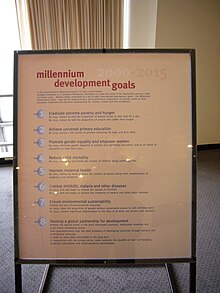서울개발 컨센서스
Seoul Development Consensus
동반성장을 위한 서울개발 컨센서스는 G20 국가 및 기타 글로벌 참여국들이 경제성장을 촉진하고 유엔의 밀레니엄 개발목표를 달성하기 위해 저개발국들과 협력할 수 있도록 지원하기 위해 마련된 원칙과 가이드라인이다. 2010년 G-20 서울 정상회의에서 G20 정상들의 지지를 얻어, 가시적인 성과 전달을 위한 다년간의 실행 계획안이 마련되었다.
오래된 워싱턴 컨센서스와는 대조적으로, 서울 컨센서스는 국가 개입을 위해 더 큰 역할을 허용한다. 그것은 획일적인 "하향식" 해법을 추구하기 보다는, 개발도상국들이 그들 필요에 가장 적합한 개혁과 정책의 패키지 설계에 앞장서는 개별 개발 도상국들의 요구조건에 맞게 해결책이 맞춰져야 한다고 가정한다.
당초 정의했던 워싱턴 컨센서스는 10가지 핵심 원칙의 집합체였다. 새로운 컨센서스는 6가지 핵심 원칙을 기반으로 하며 9개의 '핵심 기둥'을 가지고 있다.
핵심 원리
서울 합의의 6대 핵심 원칙은 다음과 같다.
- 경제성장에 집중하라 G20은 경제성장이 밀레니엄 개발목표를 달성하기 위한 저소득 국가의 LICs(Licens) 능력과 밀접하게 연관되어 있음을 시사한다. 그들은 포용적이고 지속가능하며 탄력적인 성장을 촉진하기 위한 조치가 평상시처럼 사업보다 우선되어야 한다고 말한다.
- 글로벌 개발 파트너십. LICs는 자신의 개발을 위한 국유적 소유권을 가지고 동등한 파트너로 취급되어야 한다. 파트너십은 투명하고 책임감이 있어야 한다.
- 글로벌 또는 지역 시스템 문제. G20은 그들의 집단행동이 유익한 변화를 전달하기 위해 가장 잘 배치되는 지역적 또는 체계적 이슈의 우선순위를 정해야 한다.
- 민간 부문 참여. G20은 성장에 기여하는 민간 행위자의 중요성을 인식하고 정책이 비즈니스 친화적이어야 한다고 제안한다.
- 상보성. G20은 다른 세계적인 배우들의 노력이 중복되는 것을 피하려고 노력할 것이며, 그들이 비교 우위에 있는 분야에 그들의 노력을 집중할 것이다.
- 결과 방향. G20은 중대한 문제를 해결하기 위한 가시적인 실질적인 조치에 초점을 맞출 것이다.[1][2]
주요 기둥
9개의 핵심축은 개발도상국 내에서 가장 관심이 필요한 분야로 여겨지고 있다. 1)인프라, 2)민간투자 및 일자리창출, 3)인적자원개발, 4)무역,5)재정포용,6)탄력성장, 7)식량안보, 8)국내자원동원 9)지식공유다.[1][2]
서울 합의의 역사
창조
개발 문제는 2009년 런던 정상회담 이후 G20 정상급에서 논의돼 왔다.[3] 2010년 토론토 정상회의가 끝난 후 G20은 성명서를 발표하면서 "개발 격차를 줄이고 빈곤을 줄이는 것이 그들의 더 넓은 목표에 필수적"이라고 말했다.[2] 다음 정상회담이 서울에서 열릴 것이라고 발표된 직후, 옥스팜을 포함한 시민 사회 행위자들은 소위 "서울 개발 컨센서스"[3]를 옹호하기 시작했다. G20의 합의문 초안에는 가장 가난한 나라들이 G20 경제의 시장에 제한 없이 접근할 수 있도록 허용하는 조항이 포함되어 있었는데, 이 조항은 NGO들과 교황과 같은 종교 지도자들이 2009년 사회 백과사전에서도 강력히 주장해 왔다. 그 조항은 모든 회원들이 동의할 수 없었기 때문에 최종 선언에서 삭제되었다.[4]
실행
G20은 2011년 4월 재무장관 회의가 끝난 후 공동선언문을 발표해 9월 중 고위급 위원회에서 구체적인 권고안을 발표할 것으로 예상한다며 컨센서스 이행의 중요성을 강조했다.[5]
Reactions
Initial reactions on the Seoul consensus have been mixed. An editorial in The Financial Times described its "pragmatic and pluralistic view of development" as appealing, but also suggested it might "do little more than drive another nail into the coffin of a long-deceased Washington consensus" [6] An article published by The Wall Street Journal was somewhat more positive, noting that a concrete step already taken was to create a new panel of 12 countries that would work on infrastructure financing.[7] The Korean Daily News published an article suggesting the Consensus may turn out to be the only durable achievement of the Seoul Summit.[8]
British charity CAFOD said the new consensus was "eerily familiar" compared to the earlier Washington version, and were not pleased with the emphases on involving the private sector, especially with infrastructure.[9] Oxfam's Avinash Kumar was disappointed by the whole focus on physical infrastructure, suggesting a clearer commitment to improving social infrastructure in less developed countries would have been better.[10]
Some scholars noted the consensus offered vague announcements, but limited details in implementation, others noted just comestic changes between Washington and Seoul Development consensus, hence just "all talk, but no walk".[11][12]
See also
Notes and references
- ^ a b G20 (2010-11-12). "COMPLETE TEXT: G-20 Seoul Communique". G20 and abtimes. Retrieved 2010-11-17.
- ^ a b c "Seoul Development Consensus for Shared Growth" (PDF). G20 Seoul Summit. 2010-11-12. Archived from the original (PDF) on 2010-11-16. Retrieved 2010-11-17.
- ^ a b "The Making of a Seoul Development Consensus" (PDF). Oxfam. 2010-10-11. Retrieved 2010-11-17.
- ^ Chris Giles, Alan Beattie and Christian Oliver in Seoul (2010-11-12). "G20 shuns US on trade and currencies". The Financial Times. Retrieved 2010-11-12.
- ^ Scott Lanman / G20 team (2011-04-15). "G-20 Agrees on Guidelines to Judge Imbalances: Full Text". Bloomberg L.P. Retrieved 2011-05-06.
- ^ "G20 show how not to run the world". The Financial Times. 2010-11-12. Archived from the original on 2010-11-13. Retrieved 2010-11-12.
- ^ EVAN RAMSTAD (2010-11-17). "G-20's Host Pushes Seoul Consensus". The Wall Street Journal. Retrieved 2010-11-13.
- ^ Kim Ki-cheon (2010-11-16). "The Significance of the 'Seoul Consensus'". The Chosun Ilbo. Retrieved 2010-11-19.
- ^ Christian Oliver, Chris Giles and Alan Beattie in Seoul (2010-11-12). "Forget summit failures, look at G20 record". The Financial Times. Retrieved 2010-11-17.
- ^ Avinash Kumar (2010-11-15). "Seoul curry: Notes from the G20-summit". hindustantimes. Archived from the original on November 29, 2010. Retrieved 2010-11-17.
- ^ "Development and the G20".
- ^ http://revistaestudospoliticos.com/wp-content/uploads/2015/02/Vol.5-N.1-p.74-94.pdf[dead link]



